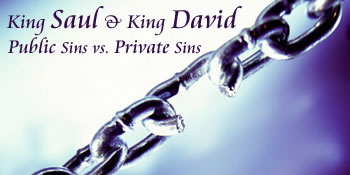
Saul and David were both among the first kings of the Jewish people. There are many points of similarity between them: both were young men from small villages; both were anointed as kings by the Prophet Samuel; and both were war heroes who rescued their people at times of distress.
Yet what a tremendous difference between their fates! King Saul was killed in battle and did not merit to have his sons become kings after him, whereas King David died peacefully, his descendants formed a glorious dynasty of kings and rulers, and he received Divine promise that the throne of kingship over the Jewish people will remain in the hands of his descendants for ever.
The Sages of Israel discussed this difficult question already thousands of years ago, and many of them accounted for this by saying that King Saul was punished for his sins. However, King David also sinned! And the Bible, which shows partiality to no one, describes David's failures and sins, just as it describes his greatness.
It seems that the root of the difference in the fate of these two great men is in the different kinds of sins they committed. King Saul was, in his private life, a pure man; there are no scandalous stories about his family life, his relationships with women, or his religious observance. However, in his public life, in his role as king, he succumbed to opposing emotions: indecisiveness on the one hand, and uncompromising stubbornness on the other; compassion and a gallant gesture towards an enemy (I Samuel, chapter 15) - as against cruelty and insensitivity towards the suffering of his own people (Ibid., end of chapter 22). Personal suspicion and paranoia became things that occupied the army, the governing institutions and the state, which created distortions in all the systems of government (Ibid., chapters 23-26), and were combined with personal feelings of regret and uncertainty.
David's sins, on the other hand, are private sins; they are his individual transgressions: in his relationships with women, and with his sons. On the public plane, however, David does not allow personal weaknesses to interfere with what is good for the people (see II Samuel 19:1-9). David's confession "Against You, You alone, I have sinned, and done evil in Your sight" (Psalms 51:6) is, to a great extent, true. As far as his actions as a leader are concerned, no blemish can be found.
It should be remembered that the Bible's test for public, political action is not its practical success. Saul's war against Amalek was a decisive event: from that point on, Amalek ceased to be a politically significant element. Still, the events of this war are counted among Saul's sins. On the other hand, many of David's wars do not bring about clear historical results, whereas one of his diplomatic activities results in a rough war (II Samuel chapter 10) - yet none of this is held against him on his record.
Does this imply that individual transgressions are of lesser importance? Not at all; one does get punished for such sins, and punishment may sometimes be quite terrible (see Ibid., chapter 12:7-14). But individual sins are measured, and punished, on the individual plane, while public sins, or public fulfillment of commandments, receive their due reward on an historical plane for generations.
Thus, even after all of Saul's sins, the Bible still calls him "God's chosen one," nor does it forget David's transgressions (see I Kings 15:5). But in the very final analysis, "For David's sake did the Lord his God give him a lamp in Jerusalem to set up his son after him, and to establish Jerusalem" (Ibid., verse 4). For kingship is based on the king's royalty, on his ability to transcend his flaws, on his adherence in what is proper and necessary for the kingship. And for this, he receives a reward for generations to come.

